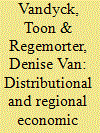| Srl | Item |
| 1 |
ID:
132611


|
|
|
|
|
| Publication |
2014.
|
| Summary/Abstract |
We analyse the macroeconomic and distributional effects of increased oil excises in Belgium by combining a regional Computable General Equilibrium (CGE) model with a microsimulation framework that exploits the rich detail of household-level data. The link between the CGE model and the microlevel is top-down, feeding changes in commodity prices, factor returns and employment by sector into a microsimulation model. The results suggest that policymakers face an equity-efficiency trade-off driven by the choice of revenue recycling options. When the additional revenue is used to raise welfare transfers to households, the reform is beneficial for lower income groups, but output levels decrease in all regions. However, when the energy tax revenue is used to lower distortionary labour taxes, the tax shift is slightly regressive. In this case, national GDP is hardly affected but regional production levels diverge. The impact of the environmental tax reform on income distribution depends strongly on changes in factor prices and welfare payments, whereas sector composition is an important determinant for regional impact variation.
|
|
|
|
|
|
|
|
|
|
|
|
|
|
|
|
| 2 |
ID:
091535


|
|
|
|
|
| Publication |
2009.
|
| Summary/Abstract |
This paper examines the effects of replacing current fuel taxes by a system of taxes that account better for all the different external costs of the different transport modes. One of the important implications of this reform is that current fuel taxes are decreased to a level of 80 euro/ton of CO2 but that the mileage related taxes on car and truck use increase. Using the TREMOVE model for the transport sector of 31 European countries, one finds that the volume of transport will decrease because current taxes on transport are too low compared to overall external costs. Overall CO2 emissions will decrease slightly. Using the MARKAL-TIMES model for the Belgian energy sector, putting all sectors and technologies on equal footing shows that a fuel tax reform makes that it is not cost efficient to require large CO2 emission reductions in the transport sector and that traditional car technologies will continue to dominate the car market in 2020-2030.
|
|
|
|
|
|
|
|
|
|
|
|
|
|
|
|